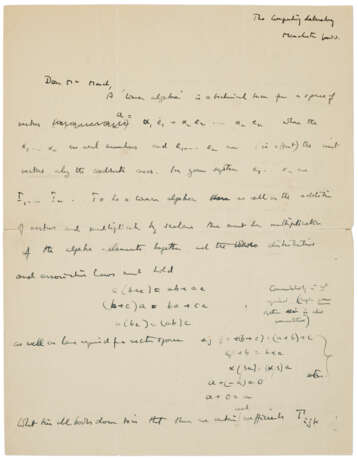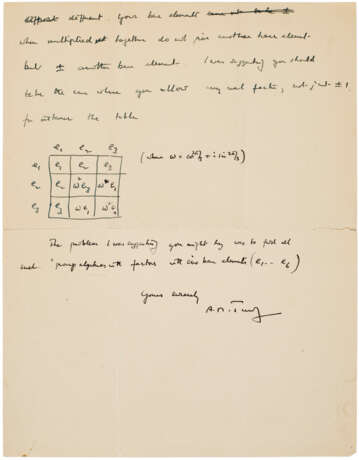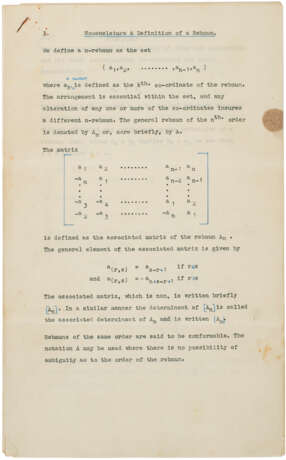ID 1236338
Los 107 | Proofing the algebraic equations of a young mathematician
Schätzwert
$ 80 000 – 120 000
Three pages, 279 x 216mm (partial tears along horizonal folds, slight marginal tear to second leaf, extremely light dustsoiling). [With:] MARCH, Lionel (1934-2018). Autograph manuscript, "Theory of Rebmuns a Suggestion," signed ("L. J. March"), Hove, c. 1953. Bound manuscript, 30 pages, 203 x 162mm. Paper boards, titled in manuscript; [MARCH, Lionel.] Typescript, "Nomenclature & Definition of a Rebmun," n.p., n.d. 14 pages, 325 x 202mm, with pencil and ink emendations in March's hand (stapled at top left with two pages loose, marginal tears).
Alan Turing poses a mathematical exercise in group algebra to a promising student. A superb letter between two prodigies, Turing writes to Lionel March, who at age 17, developed a new form of algebra that he called "Redmun," (or "number" spelled in reverse). March developed it with no outside consultation, not even sharing his work with his teachers at the County Grammar School for Boys in Hove. Instead, he typed up a treatise and sent it to Frank Roberts, a professor at University College in London, who was so impressed he forwarded it on to Turing at Manchester University. Impressed, Turing wrote to March that he had done his "research with imagination and competence and I hope you will find time for more." Turing here acts the mentor, first conveying some of the basic ideas of linear and group algebras – “a ‘linear algebra’ is a technical term for a space of vectors,” etc. — and then critiquing March’s work, before posing a problem to be solved: "Yours was a little different [than a group algebra]. Your base elements when multiplied together do not give another base element but +/- [plus-minus] another base element. I was suggesting you should take the case where you allow any real factor, not just +/- [plus-minus], for instance the table [a 3 x 3 matrix, illustrated]... The problem I was suggesting you might try was to find all such 'group algebras with factors with six base elements’." Turing’s life-work was much entwined with group theory: both his earliest published works, and too one of his final publications, explicitly dealt with the topic; and Turing’s facility with the field was in good measure responsible for his ability to crack the encoding technique of the Enigma machine (used by the Germans during World War II).
Turing took a continued interest in March and helped him gain admission to Cambridge University (Magdalene College). March later had a distinguished career in architecture and urban design, In an 2013 interview, March recalled that when Turing posed this problem to him, it was well "before I knew who he was and before the world knew who he was. He was in Manchester, that's when they developed 'our' computer, with many people from Cambridge, and there had been a time when I'd been told I should go to Manchester because of the stellar group. But I didn't know about it, and at the same time there was a great enthusiasm to get people into Oxbridge, and Magdalene was experimenting with taking a working class student…" In regards to the present manuscript, March admitted that he "didn't even understand the problem he posed! It hit the headlines, me doing this piece of mathematics, but though it was glorious it was completely useless, except for the idea of extending mathematics into three or four dimensions' (interview in Cambridge Business, No. 26, Nov-Dec 2013).
| Künstler: | Alan Mathison Turing (1912 - 1954) |
|---|---|
| Herkunftsort: | Vereinigtes Königreich |
| Kategorie des Auktionshauses: | Briefe, Dokumente und Manuskripte, Medizin und Wissenschaft |
| Künstler: | Alan Mathison Turing (1912 - 1954) |
|---|---|
| Herkunftsort: | Vereinigtes Königreich |
| Kategorie des Auktionshauses: | Briefe, Dokumente und Manuskripte, Medizin und Wissenschaft |
| Adresse der Versteigerung |
CHRISTIE'S 8 King Street, St. James's SW1Y 6QT London Vereinigtes Königreich | |
|---|---|---|
| Vorschau |
| |
| Telefon | +44 (0)20 7839 9060 | |
| Aufgeld | see on Website | |
| Nutzungsbedingungen | Nutzungsbedingungen |





